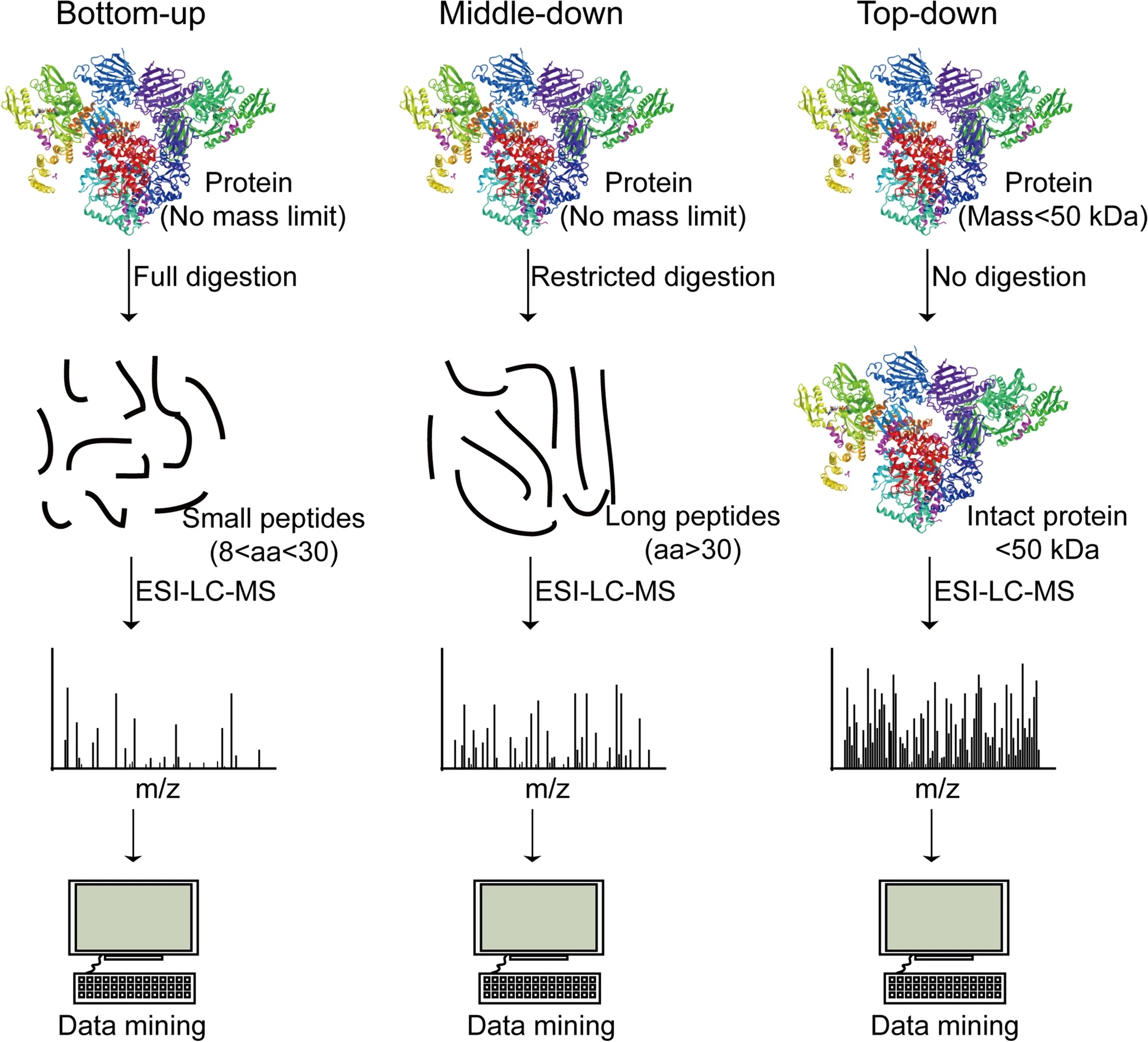MS-Based Post-Translational Modification Analysis Service
Post-translational modifications (PTMs) play a vital role in regulating protein activity, localization, stability, and interaction networks. Their precise characterization is essential for understanding biological regulation and disease mechanisms.
MtoZ Biolabs provides comprehensive MS-based Post-Translational Modification Analysis Service that enables the qualitative and quantitative study of diverse PTMs using high-resolution mass spectrometry. By combining top-down, middle-down, and bottom-up proteomics strategies, we deliver accurate and reproducible PTM profiling for both research and biopharmaceutical applications.
Services at MtoZ Biolabs
To meet different analytical objectives, MtoZ Biolabs offers three complementary workflows under our MS-based PTM service platform. Each method is optimized for specific protein sizes, structural complexities, and research purposes.
|
Service Type |
Analytical Focus |
Key Advantages |
Typical Applications |
|
Top-Down MS-Based Post-Translational Modification Analysis Service |
Intact protein analysis without digestion |
Maintains full proteoform information and identifies multiple modification sites |
Characterization of protein isoforms, small proteins, and biotherapeutics |
|
Bottom-Up MS-Based Post-Translational Modification Analysis Service |
Complete digestion into short peptides |
High throughput and sensitive quantification across large sample sets |
Global PTM profiling, signaling analysis, biomarker discovery |
|
Middle-Down MS-Based Post-Translational Modification Analysis Service |
Analysis of large proteolytic fragments |
Preserves PTM connectivity and domain-level context |
Histone modification mapping, antibody fragment analysis, structural biology |
Using Orbitrap and timsTOF mass spectrometers, along with advanced fragmentation methods such as HCD, ETD, and ECD, our MS-Based Post-Translational Modification Analysis Service provides comprehensive identification and quantification of PTMs with high sensitivity and accuracy.

Sun, M. et al. Cell Biosci. 2022.
Figure 1. Schematic Workflow of Bottom-Up Proteomics, Middle-Down Proteomics, and Top-Down Proteomics
Analysis Workflow
1. Project Consultation
Define research goals and select the most appropriate MS-based workflow.
2. Sample Preparation
Perform digestion or limited proteolysis tailored to the analytical approach, with optional PTM enrichment.
3. LC-MS/MS Acquisition
Conduct high-resolution analysis using optimized MS parameters for precise PTM detection.
4. Data Processing
Identify and quantify modified peptides or intact proteins using curated databases and specialized software.
5. Bioinformatics Interpretation
Generate detailed reports with site mapping, quantitative results, and biological pathway analysis.
Sample Submission Suggestions

Note: Provide details on sample collection and handling. If you need further details, our technical support team is happy to assist and provide comprehensive guidance on sample submission.
Applications
● Comprehensive PTM Profiling: Identify and quantify phosphorylation, acetylation, ubiquitination, glycosylation, methylation, and other modifications.
● Epigenetic Research: Characterize histone modification patterns to study chromatin regulation.
● Mechanistic Biology and Disease Research: Investigate PTM-mediated signaling and pathway regulation in disease models.
● Biopharmaceutical Characterization: Evaluate modification integrity, sequence variants, and structural heterogeneity in therapeutic proteins.
● Biomarker Discovery: Detect PTM-based molecular signatures for diagnostic and translational studies.
Why Choose MtoZ Biolabs?
✅ Integrated top-down, middle-down, and bottom-up analytical platforms
✅ Advanced high-resolution mass spectrometry systems
✅ Customizable study design for different PTM types
✅ Experienced scientific team for expert data interpretation
✅ Consistent and reproducible data supported by robust QC procedures
The MS-Based Post-Translational Modification Analysis Service at MtoZ Biolabs offers a complete solution for studying protein modifications across all structural levels. Combining advanced mass spectrometry and specialized data analysis, we help researchers achieve accurate, reproducible, and biologically meaningful insights into complex PTM mechanisms.
For more details or to request a free consultation, contact MtoZ Biolabs today.
What Could be Included in the Report?
1. Comprehensive Experimental Details
2. Materials, Instruments, and Methods
3. Total Ion Chromatogram & Quality Control Assessment
4. Data Analysis, Preprocessing, and Estimation
5. Bioinformatics Analysis
6. Raw Data Files
Related Services







